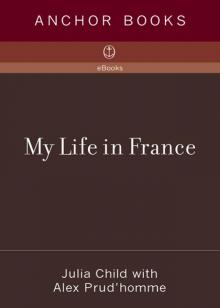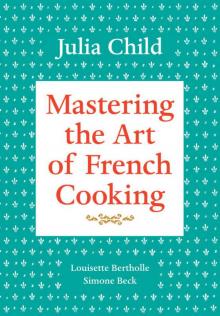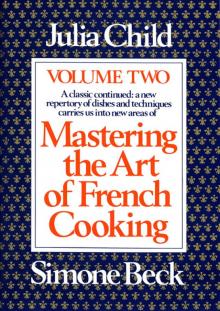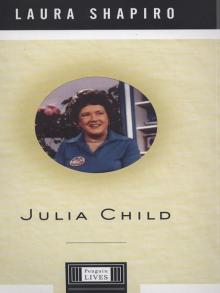- Home
- Julia Child
My Life in France Page 5
My Life in France Read online
Page 5
We spent the night in Vienne, and were still so full of Chef Pierrat’s lunch that we could only fit a small dinner into our gullets. Our bodies hummed with contentment. Even the Flash seemed to purr.
“Incroyable! Ravissant!” we intoned in unison the next day, as vista after gorgeous vista revealed itself. Every field was an explosion of fragrant and colorful bougainvilleas, brooms, mimosas, or daisies. Warm, salty breezes blew off the Mediterranean. There were dramatic rocky cliffs along the coast, snow-topped Alps looming in the background. The air was cool and the sky was brilliant. It was all so beautiful and fragrant that I found my senses were nearly overwhelmed.
Hélène was as gay as a bobolink and an amusing source of art-historical nuggets. Paul—with one large camera, one small camera, and a monocular hung around his body—looked like a veritable American Tourist, as he happily snapped photos left and right. If it wasn’t a beautiful castle on a hilltop, then it was bands of sun-filtered mist settling in the peach orchards below. If it wasn’t a perfect fourteenth-century stone bridge, then it was a deep valley with a rushing brook bright as quicksilver. We ate nougat de Montélimar. We inhaled the smell of sage. We sang “Sur le Pont d’Avignon” as we Flashed under the bridge at Avignon. We sat on a hillside outside of Aix drinking Pouilly. At Miramar, we gathered armfuls of mimosas with the Mowrers, whom we’d met with there. In the evening, we watched the lights of Cannes winking across the darkening water.
This was my first experience of the famous Côte d’Azur, an area that was already close to Paul’s heart. It appealed to me deeply, in part because it was reminiscent of southern California, and in part because of its own rugged vitality.
On the return loop to Paris, we crossed over the mountains, and the scenery changed dramatically. Grasse, a hothouse filled with flowers, gave way to great barren limestone ridges, like hardened taffy, and tumbling rivers that were a bright aqua-blue color from the glacial melt. Nestled into hillsides were little towns where every building was made of local stone that had weathered for hundreds of years. After coffee and apéritifs at Castellane, in a deep mountain valley, we climbed up and up into sparkling cold air, the sun beating warm. Crossing Alpine passes, we drove into a world of evergreens and snow, with towns clustered in the mountain cracks like periwinkles. At Grenoble we drove into a dramatic cloud of icy fog, and spent the night in a snug little hotel in Les Abrets.
As we crossed Burgundy the next morning, the Mowrers grew tired of our dawdling and accelerated back to Paris. We were happy to take our time. We passed valley towns whose names sounded like a carillon: Montrachet, Pommard, Vougeot, Volnay, Meursault, Nuits-Saint-Georges, Beaune. The nuns, the wine, the lovely courtyards—there were so many extraordinary things to see, and by the end of the day our cups had filled to the brim. By eight-thirty that night we were back at the Roo de Loo, where we unloaded armloads of mimosas.
SPRING HAD SPRUNG in Paris. In the park on the Île de la Cité, the grass was bright green and alive with new babies, doting grannies, and fussing nannies. Along the river, barges were tied up side-by-side, and their rigging was decorated with drying white sheets and socks. Women sunned and sewed pink underwear. Fishermen dangled their feet in the water and snacked on moules. Minette had spring fever. She bolted out the window onto the roof and made gurgling noises, raced up and down the stairs, leapt into my lap then out again, then sat in the middle of the rug gurgling some more. The vet had informed me that she was not a mutt at all, but a rare type of Spanish cat called le tricolaire, which pleased me no end. When she started to gobble up our handpicked mimosa, we called her Minette Mimosa McWilliams Child.
In early April, my younger sister, Dorothy, arrived. She stood six foot three to my six-two, and was known in the family as Dort, from our childhood nicknames. She was Dort-the-Wort, or Wortesia, and I was called Julia Pulia, or, in less charitable moments, Juke-the-Puke. (Our brother, John, somehow escaped a nickname.) Dort had just graduated from Bennington, was single, and didn’t have any idea of what she wanted to do in life. So I encouraged her to come stay with us in Paris, rent-free. That was an offer that would warm the heart of any red-blooded American girl, and she hopped on the next boat.
Not in the least intimidated by her lack of French, Dort made a big impression on her first day at 81, when, for fun, she picked up the phone and began to call stores: “Bong-joor!” she honked. “Quelle heure êtes-vous fermé? . . . Mair-ci!”
Dort was five years younger than me, and fifteen years younger than Paul. She and I weren’t all that close, and, to be honest, when she arrived I felt as if I knew Hélène Baltru better than my own flesh and blood. But the longer Dort stayed with us, the closer we became.
Parisians took a shine to “the tall American girl,” and my outgoing sister’s willingness to do whatever it took to communicate. The results of her efforts were occasionally hilarious. There was, for instance, the day she went to the hairdresser’s for a shampoo and a trim and sweetly asked: “Monsieur, voulez-vous couper mes chevaux avant ou après le champignon?” The hairdresser looked at her quizzically while the ladies under the hairdryers broke into laughter. What Dort had been trying so earnestly to ask was: “Sir, would you like to cut my hair before or after the shampoo?” But it came out as: “Sir, would you like to cut my horses before or after the mushroom?”
She bought a nifty little Citroën for eleven hundred dollars. It was black, had four seats and a minuscule engine. She loved it, except that on her second day of ownership it got a short circuit at 6:00 p.m., in the middle of the rush hour in the middle of la Place de la Concorde, and tied up traffic in the center of the city. When she finally made it back home that night, poor Dort burst into tears of rage. We calmed her, and assured her that everything would be all right. Our garagistes gave the car a once-over, and soon Dorothy was zipping around town, looking for work, and staying out late with the youthful expat crowd.
ON JUNE 25, Bumby Hemingway married Puck Whitlock.
Bumby was twenty-five, short, with a square, muscular body, stiff blond hair, and a clean-cut, outdoorsy look. During the war he had parachuted behind enemy lines for the OSS to form teams of agents, and although the Germans captured him a number of times, he’d always managed to escape. Now he was in Berlin, working for U.S. Army intelligence. The wedding was held in Paris because he didn’t have enough leave-time to fly home. Besides, his mother and stepfather lived there. And it was Paris.
Puck was tall, dark, and slim, a strong and attractive Idaho girl, who had once worked for United Airlines. She had been married to Lieutenant Colonel Whitlock, a pilot killed in action over Germany. She and Bumby had met in Sun Valley, Idaho, in 1946, and he had been pursuing her ever since. They hardly knew a soul in Paris, so I acted as her matron of honor, and Paul and Dort escorted people to their seats.
The wedding was held in the American Church, on Rue de Berri, where Paul had made his reputation as Tarzan of the Apse. The officiant was Joseph Wilson Cochran, an American who had married Charlie and Freddie in that very space, in April 1926. It was a perfectly natural and unpompous ceremony, just like the Mowrers themselves. There was quite a crowd at the reception, including the writer Alice B. Toklas—an odd little bird in a muslin dress and a big floppy hat—and Sylvia Beach, owner of the famed Shakespeare & Co. bookstore. (Papa Hemingway did not attend.) The weather was heavenly: clear blue sky with high, wispy clouds, the landscape bright green and yellow, with roses abloom in the Tuileries. By the end of the afternoon, I was thoroughly marinated with strawberries and cherries, champagne, brandy, Monbazillac, Montrachet, and Calvados, and speckled by tidbits of grass.
VI. LE GRAND VÉFOUR
WHEN FRIEDA, our emotional femme de ménage, took a job as a concierge in another building, Marie des Quatre Saisons helped us find a replacement. The new girl, Coquette, chased our dust chickens and brightened our giltwork part-time, from eight to eleven every morning. But her real job was with a prince and princess who lived around the corner.
Coquett
e was very sweet but a little nutty, and in private we referred to her as “Coo-Coo” Coquette. Like Frieda, she was of humble origins, and, not surprisingly, was rather bowled over by the glamorous prince and princess. La princesse was no ordinary princess, Coo-Coo breathlessly informed me, but a “double princess,” and she was English! The prince, Philippe de B—— (a name pronounced “boy,” appropriately), had a château and was the son of a noted scientist. They had four Pekingese dogs, who were so special and so cute, Coo-Coo said, that they were practically human. “Oh, madame!” she’d sigh, the prince and princess were so noble, so chic, so much a part of the fabulous “tout Paris” café set. But the dogs were never walked and made pee-pee all over the apartment. As a result, the apartment smelled like a poubelle (garbage bin). And how did the princess react? Well, she would grab anything she could lay her hands on—one of the prince’s shirts, a table napkin, a nightgown, or even one of her own silk dresses—to wipe up the mess.
In August, the princess and her dogs left for vacation in Normandy, leaving the prince alone in Paris. This was not a good thing, for he was “un peu difficile.” Coo-Coo would prepare him a delicious lunch, but the prince wouldn’t appear until 3:00 p.m., after drinking apéritifs at a café all morning with his loutish friends. He complained about the cost of potatoes. He refused to pay the four hundred francs he owed the old woman who sewed up his coat. And when he finally decamped to the château, he neglected to pay Coo-Coo’s Social Security and the two thousand francs he owed her in salary. She was mortified. But he was a prince. What could she do?
Well, it didn’t take long for the neighborhood to get wind of Coo-Coo’s dilemma. And then the horrible truth was revealed: the prince and princess owed money all up and down the Rue de Bourgogne. Alors, everyone from the vegetable-cart lady to the tripier hated them and threw up their hands in horror when their names were mentioned!
When the prince and princess returned from their vacances, the situation did not improve. The prince would scrounge up a bit of money, then spend it all on horse races or apéritifs. The princess would “buy” a dress from a leading fashion house, wear it to a big affair, and return it for a refund. It was a scandale!
Finally, Coo-Coo had had enough, and rebelled. She suggested to the prince that if he didn’t have the money to buy potatoes, or to pay her, he should sell his title, or perhaps the château, to make ends meet. He ignored her. And when the princess treated her with extra insensitivity, Coo-Coo announced she was going to quit. But she didn’t. After all, it meant quite a lot to “les gens” that she worked for a prince and princess, even if they were cheapskate layabouts. And they owed her quite a lot of back pay, which she was hoping to recoup at least part of. I found it all deeply fascinating.
ONE DAY, Paul and I were exploring the Palais Royal park when we peeked in the windows of a beautiful old-style restaurant tucked into a corner under the arched colonnade at the far end. The dining room was resplendent with gilded decorations, a painted ceiling, cut glass and mirrors, ornate rugs and fine fabrics. It was called Le Grand Véfour. We had unknowingly stumbled onto one of the most famous of the old Parisian restaurants, which had been in business since about 1750. The maître d’hôtel noticed our interest, and waved us in. It was near lunchtime, and though we were hardly used to such elegance, we looked at each other and said, “Why not?”
There weren’t many patrons yet, and we were seated in a gorgeous semicircular banquette. The headwaiter laid menus before us, and then the sommelier, an imposing but kindly Bordeaux specialist in his fifties, arrived. He introduced himself with a nod: “Monsieur Hénocq.” The restaurant began to fill up, and over the course of the next two hours we had a leisurely and nearly perfect luncheon. The meal began with little shells filled with sea scallops and mushrooms robed in a classically beautiful winy cream sauce. Then we had a wonderful duck dish, and cheeses, and a rich dessert, followed by coffee. As we left in a glow of happiness, we shook hands all around and promised almost tearfully to return.
What remained most vividly with me as we strolled away was the graciousness of our reception and the deep pleasure I’d experienced from sitting in those beautiful surroundings. Here we were, two young people obviously of rather modest circumstances, and we had been treated with the utmost cordiality, as if we were honored guests. The service was deft and understated, and the food was spectacular. It was expensive, but, as Paul said, “you are so hypnotized by everything there that you feel grateful as you pay the bill.”
Me looking out the window of the Roo de Loo
We went back to the Véfour every month or so after that, especially once we’d learned how to get invited there by wealthy and in-the-know friends. Because I was tall and outgoing and Paul was so knowledgeable about wine and food, Monsieur Hénocq and the Véfour’s wait staff always gave us the royal treatment. And that is where we first laid eyes on Grande Dame Colette. The famous novelist lived in an apartment in the Palais Royal, and the Véfour kept a special seat reserved in her name in a banquette at the end of the dining room. She was a short woman with a striking, almost fierce visage, and a wild tangle of gray hair. As she paraded regally through the dining room, she avoided our eyes but observed what was on everyone’s plate and twitched her mouth.
VII. LA MORTE-SAISON
THE NEWSPAPERS CLAIMED that the summer of 1949 was the worst sécheresse, or drought, since 1909. Riverbeds were filled with stones, fields were toasted gold, and the grass was crunchy to walk on. Leaves were drying up on trees, crops of vegetables were destroyed, grapes withered on the vine. With almost no water for hydroelectric power, people began to worry about the price of food in the coming winter. Air-conditioning was nonexistent.
On weekends, everyone headed out of town to cool off in a favorite hidden picnic spot. Many couples used tandem bicycles. The men would sit in front and women in back, usually dressed in matching costumes of, say, blue shorts, red shirt, and white hat. They’d furiously pedal along the highways, sometimes with a baby in a box on the handlebars, or a little dog in a box jiggling on the back fender.
On the Fourth of July, a reception for several thousand was held at the U.S. Embassy, and it seemed that every American in Paris was there, all talking at once. We were surprised to run into five people who we didn’t know were living in the city, including our old friends Alice and Dick, who were acting very strange. I felt that Alice, in particular, was snubbing us. I didn’t understand why. Perhaps she was miserable. But then she suddenly blurted out how much she loathed the Parisians, whom she considered horrid, mean, grasping, chiseling, and unfriendly in every way. She couldn’t wait to leave France, she claimed, and would never return.
Alice’s words were still ringing in my ears the next morning, when I went marketing and suffered a flat tire, broke a milk bottle, and forgot to bring a basket for my strawberries. Yet every person I met was helpful and sweet, and my nice old fish lady even gave me a free fish-head for Minette.
I was flummoxed and upset by Alice. She was someone I had once considered a good and sympathetic friend, but I just didn’t understand her anymore. In contrast to her, I felt a lift of pure happiness every time I looked out the window. I had come to the conclusion that I must really be French, only no one had ever informed me of this fact. I loved the people, the food, the lay of the land, the civilized atmosphere, and the generous pace of life.
AUGUST IN PARIS was known as la morte-saison, “the dead season,” because everybody who could possibly vacate did so as quickly as possible. A great emptying out of the city took place, as hordes migrated toward the mountains and coasts, with attendant traffic jams and accidents. Our favorite restaurants, the creamery, the meat man, the flower lady, the newspaper lady, and the cleaners all disappeared for three weeks. One afternoon I went into Nicolas, the wine shop, to buy some wine and discovered that everyone but the deliveryman had left town. He was minding the store, and in the meantime was studying voice in the hope of landing a role at the opera. Sitting next to him was a
n old concierge who, twenty-five years earlier, had been a seamstress for one of the great couturiers on la Place Vendôme. She and the deliveryman reminisced about the golden days of Racine and Molière and the Opéra Comique. I was delighted to stumble in on these two. It seemed that in Paris you could discuss classic literature or architecture or great music with everyone from the garbage collector to the mayor.
On August 15, I turned thirty-seven years old. Paul bought me the Larousse Gastronomique, a wonder-book of 1,087 pages of sheer cookery and foodery, with thousands of drawings, sixteen color plates, all sorts of definitions, recipes, information, stories, and gastronomical know-how. I devoured its pages even faster and more furiously than I had Ali-Bab.
By now I knew that French food was it for me. I couldn’t get over how absolutely delicious it was. Yet my friends, both French and American, considered me some kind of a nut: cooking was far from being a middle-class hobby, and they did not understand how I could possibly enjoy doing all the shopping and cooking and serving by myself. Well, I did! And Paul encouraged me to ignore them and pursue my passion.
I had been cooking in earnest at Roo de Loo, but something was missing. It was no longer enough for me to salivate over recipes in the Larousse Gastronomique, or chat with Marie des Quatre Saisons, or sample my way through the menus of wonderful restaurants. I wanted to roll up my sleeves and dive into French cuisine. But how?
Out of curiosity, I dropped by L’École du Cordon Bleu, Paris’s famous cooking school. There professional chefs taught traditional French cooking to serious students from all over the world. After attending a demonstration one afternoon, I was hooked.

 Julia's Kitchen Wisdom
Julia's Kitchen Wisdom My Life in France
My Life in France Mastering the Art of French Cooking, Volume 1
Mastering the Art of French Cooking, Volume 1 Mastering the Art of French Cooking, Volume 2
Mastering the Art of French Cooking, Volume 2 Laura Shapiro
Laura Shapiro